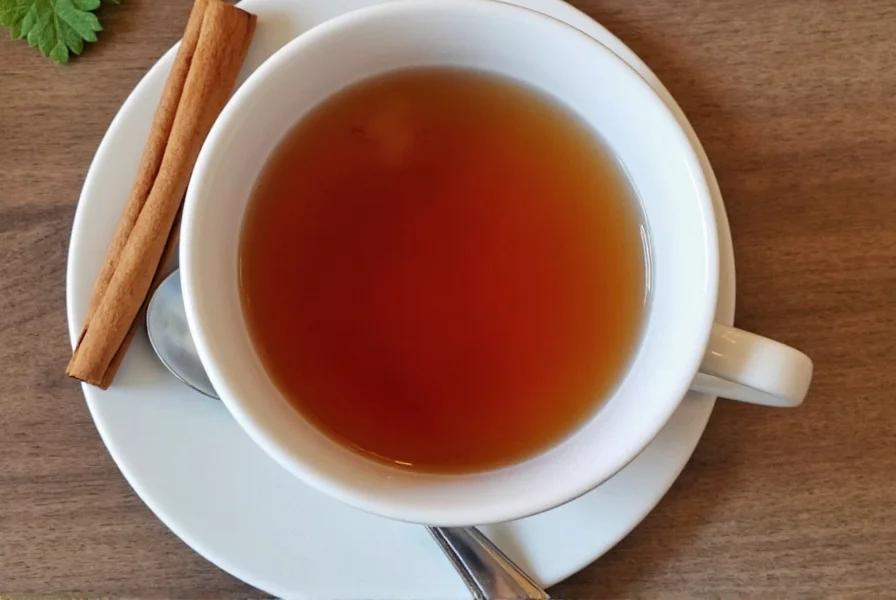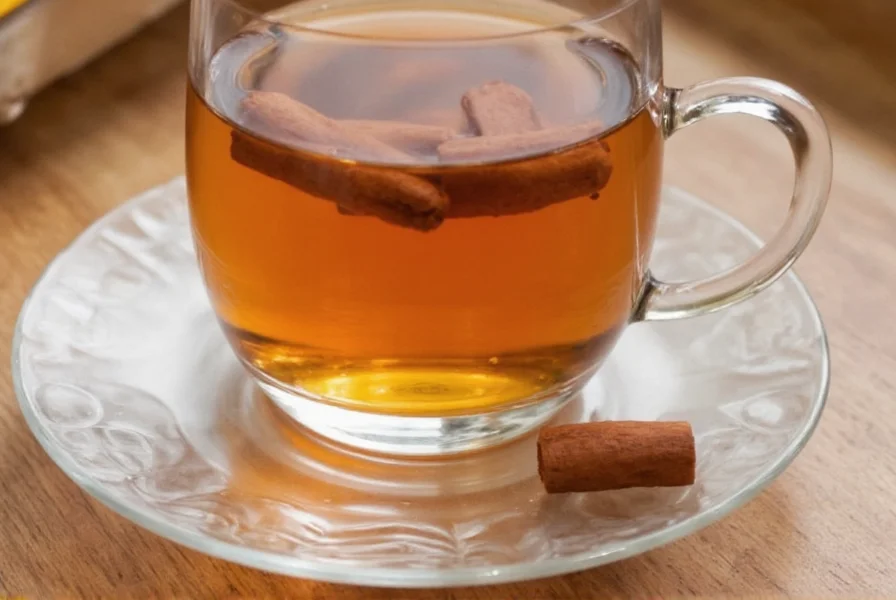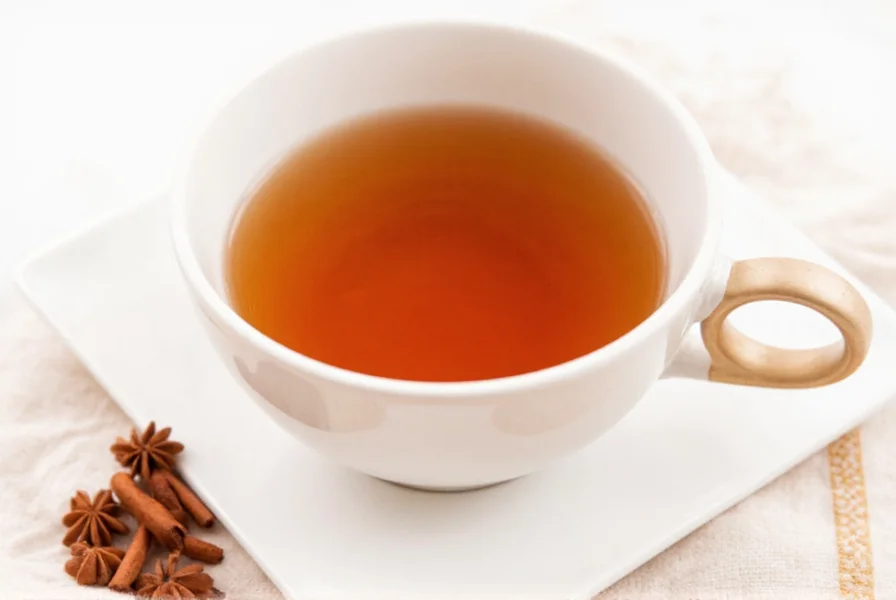The simplest cinnamon tea recipe requires just 2 ingredients: 1-2 cinnamon sticks and 2 cups of water. Simmer for 10-15 minutes, strain, and enjoy. For enhanced flavor, add honey or lemon after brewing. This warming beverage offers a naturally sweet, spicy taste without added sugar.
Nothing compares to the comforting aroma of freshly brewed cinnamon tea on a chilly morning. This ancient beverage has been enjoyed for centuries across cultures, from traditional Chinese medicine practices to Mexican agua de canela. Unlike many herbal teas that require multiple ingredients, cinnamon tea stands beautifully on its own with minimal preparation. Whether you're seeking a caffeine-free alternative to coffee or a soothing evening drink, this simple recipe delivers rich flavor with remarkable ease.

Perfect Cinnamon Tea Recipe: Step-by-Step
Creating authentic cinnamon tea requires attention to detail. While the basic recipe is straightforward, these professional techniques ensure optimal flavor extraction and balance.
| Ingredient | Standard Amount | For Stronger Flavor | For Milder Taste |
|---|---|---|---|
| Cinnamon sticks (not powder) | 1-2 (3-inch) | 3-4 sticks | 1 stick |
| Water | 2 cups | 2 cups | 2 cups |
| Brewing time | 10-15 minutes | 20-25 minutes | 7-10 minutes |
Traditional Stovetop Method
- Break cinnamon sticks into smaller pieces using a mortar and pestle or knife (increases surface area for better flavor extraction)
- Add to 2 cups of cold water in a small saucepan
- Bring to a gentle simmer over medium heat (do not boil vigorously)
- Reduce heat to low and simmer uncovered for 10-15 minutes
- Remove from heat and let steep an additional 5 minutes
- Strain into your favorite mug
- Add optional enhancements after brewing (see variations below)
Popular Cinnamon Tea Variations
While pure cinnamon tea shines on its own, these thoughtful additions create distinctive experiences without overwhelming the primary flavor.
Honey-Cinnamon Immune Support Tea
Add 1 teaspoon raw honey and a thin slice of fresh ginger after brewing. The honey's natural enzymes remain active when added to cooled tea (below 140°F/60°C), preserving potential wellness benefits. This easy cinnamon tea recipe variation provides balanced sweetness with complementary warmth.
Citrus-Infused Cinnamon Tea
Squeeze half a lemon or orange into your finished tea. The citrus brightens the deep spice notes while adding vitamin C. For an elegant presentation, add a thin citrus slice as garnish. This how to make cinnamon tea at home variation works particularly well with Ceylon cinnamon's delicate flavor profile.

Chai-Spiced Cinnamon Tea
Add one cardamom pod, 2 whole cloves, and a thin slice of fresh ginger to the pot during brewing. Remove spices before serving. This variation creates a simplified chai experience using the best cinnamon tea preparation method as its foundation.
Expert Brewing Tips for Superior Results
Professional tea makers emphasize these often-overlooked details that transform ordinary cinnamon tea into an exceptional beverage:
- Always use cinnamon sticks rather than powder - Powder creates sediment and can make tea bitter
- Simmer gently - Boiling destroys delicate aromatic compounds
- Cover while steeping - Traps volatile oils that provide cinnamon's characteristic aroma
- Use filtered water - Minerals in hard water can interfere with flavor extraction
- Store leftover tea properly - Refrigerate in airtight container for up to 3 days
Understanding Cinnamon Types for Tea Making
Not all cinnamon works equally well for tea. Understanding these varieties helps you select the best option:
- Ceylon cinnamon ("true cinnamon") - Delicate, sweet flavor with subtle citrus notes. Ideal for those preferring milder spice. Contains lower coumarin levels.
- Cassia cinnamon - Stronger, more pungent flavor commonly found in supermarkets. Higher coumarin content - limit to 1 stick per serving if consuming regularly.
- Saigon cinnamon - Intensely aromatic with higher oil content. Use sparingly as it can dominate other flavors.
Traditional Uses and Wellness Context
Cinnamon has been incorporated into traditional wellness practices across multiple cultures for centuries. Ancient Egyptians used it in preservation rituals, while traditional Chinese medicine practitioners included it in formulas for circulation support. In Mexican tradition, agua de canela serves as both a comforting beverage and digestive aid after meals.
Modern research continues exploring cinnamon's properties, though scientific consensus remains limited regarding specific health outcomes. The simple spiced tea recipe presented here focuses on culinary enjoyment rather than therapeutic claims. Many tea enthusiasts appreciate cinnamon tea as part of a balanced lifestyle that includes diverse whole foods and regular physical activity.
Frequently Asked Questions
How long does homemade cinnamon tea stay fresh?
Brewed cinnamon tea maintains best flavor when consumed immediately. For storage, refrigerate in an airtight container for up to 3 days. Reheat gently without boiling to preserve flavor compounds. Avoid adding honey or citrus before storage as these can ferment.
Can I use ground cinnamon instead of sticks for tea?
While possible, ground cinnamon creates sediment and can produce a bitter taste if overused. If using powder, limit to 1/4 teaspoon per cup and strain carefully through a fine mesh sieve. Cinnamon sticks provide more consistent flavor and easier preparation for this cinnamon stick tea recipe.
What's the ideal water temperature for brewing cinnamon tea?
Unlike delicate green teas, cinnamon benefits from near-boiling water. Bring water to a full boil (212°F/100°C), then reduce to a gentle simmer. The high temperature properly extracts cinnamon's essential oils. Avoid maintaining a rolling boil as this can make the tea bitter.
How can I make cinnamon tea without a stove?
For a stove-free method, place broken cinnamon sticks in a heatproof container, pour freshly boiled water over them, and steep covered for 15-20 minutes. An electric kettle works perfectly for this homemade cinnamon tea variation. While not as robust as simmered tea, this method still yields satisfying flavor.











 浙公网安备
33010002000092号
浙公网安备
33010002000092号 浙B2-20120091-4
浙B2-20120091-4